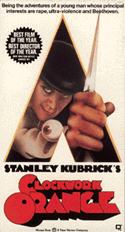 Study
Questions: Week Eight
Study
Questions: Week Eight Study
Questions: Week Eight
Study
Questions: Week Eight
The Old Ultraviolence, from Australopithecus to Alex and Droogs
2001:A Space Odyssey (1967) and A Clockwork Orange (1971)
2001 and A Clockwork Orange seem very different in subject and theme, but they have many things in common, not the least of them Kubrick's dark view of human nature, and A Cloclwork Orange constantly calls the viewer attention to the previous film. They both envision a near future when technological advances have outstripped human moral development, and technological development goes hand-in-hand with the diminishment of human values. Finally, both films suggest that the spirit of primordial murderers from whom we descend is not far beneath the surface of modern humanity.
2001, A Space Odyssey: Dave, I Think I Am Losing My Mind.
1. What is the condition of humankind at the beginning of the "Dawn of Man" section?
2. What is the significance of the first tool? How is it used?
3. In the famous jump cut from the tossed bone to a space vehicle, what connections is Kubrick suggesting between technology and violence? Between evolution and the idea of homo farbens (toolmaking humans)?
4. What comparisons might be made between the powerful arm of the proto-human ape and the hand of Dr. Floyd (William Sylvester) floating in space? Between the bone and the floating pen?
5. How does Floyd's meeting with the Russian scientists suggest the encounter od the Australopithicines in the first segment of the film? In what ways does enact a civilized version of the apes in the "Dawn of Man" sequence?
6. Is there any thematic significance in the flight to the moon and the docking sequences, or is it merely spectacle? What is the significance of "The Blue Danube" waltz on the sound track?
7. In what ways does the use of familiar brand names in space familiarize the strange and disorienting?
8. Why is Floyd so insufferably dull? In fact, why are all his colleagues so dull? What cultural contradictions are suggested? Could you argue that 2001 is an ironic comment on the science fiction genre?
9. What does the dysfunctional HAL tell us about the limits of logic, technology, and the intellect? How does the contrast between his vioce and his actions offer a critique of polite reasonableness?
10. The final stargate episode has been the object of much critical speculation. Is the light show effective in your estimation? What is the significance of the aging Bowman (Kier Dullea) and his rebirth as the star child? Does he represent a moral as well as an evolutionary advance for humankind? What might be the significance that the eye image at the end of 2001 is matched by the opening eye (Alec's) image in A Clockwork Orange?
A Clockwork Orange: Viddy Well, O My Droogies
1. The opening shot which begins with Alex's (Malcom MacDowell) eye and pans back to introduce his droogies and the milk bar tells us a great deal about the characters before a word id spoken. What do you learn about Alex and his world?
2. There are numerous allusions to 2001 in the film: the stolen car reads DAV(E) on the license plate, the sound track to 2001 is on sale in a music store, the fight with Billy Boy in the deserted casino and the attack on the aging drunk recall the apes in the previous film, and Alex eating in silence at the Alexander home resembles Bowman at the conclusion of 2001. Are these references merely a director's signature (like Hitchcock's cameos in his films), or are there thematic relationships between the films (i.e. the view of the future, human violence, the use of institutional power, etc.)?
3. In most satires there is a figure who represents the moral perspective from which to judge the other characters (and to find them wanting)? Is there such a figure in A Clockwork Orange? Who might it be?
4. The drunk attacked by Alex and droogs bitterly condemns "a stinkin' world" no longer interested in law and order where a concern with space flight leaves the old ways and people victims of the young. Is there any indication that the old ways (represented by the prison warden and chaplin) were any better?
5. What is the thematic significance of having all of Alex's encounters in the first half of the film repeated in the second half?
6. How does the musical serve as ironic counterpoint to the events it accompanies? For example, the use of "The Thieving Magpie Overature" in the derilect casino scene or Beethoven's Ninth Symphony throughout ("The Ode to Joy in the Fourth Movement begins: "All Mankind will become Brothers').
7. How, specifically, do both the police inspector who interrogates Alex after the Cat Lady's murder, and the Minister of the Interior who sends him to the Ludivico Center both exemplify Machivallean pinciples and the ruthless exercise of power behind an exterior of polite hypocrisy?
8. What does the apartment and the clothes of Alex' parents reveal about their characters and culture? In what ways might their sentimentality and their law-abiding natures be seen as worse than their son's lawlessness?
9. In what ways does the future world of A Clockwork Orange resemble George Orwell's 1984? In what ways is it significantly different?
10. Are any of Alec's victims morally superior to him? Consider the behavior of the leftist writer and his political allies, the vengeful old drunks, and the moral nature of the doctors and scientists.